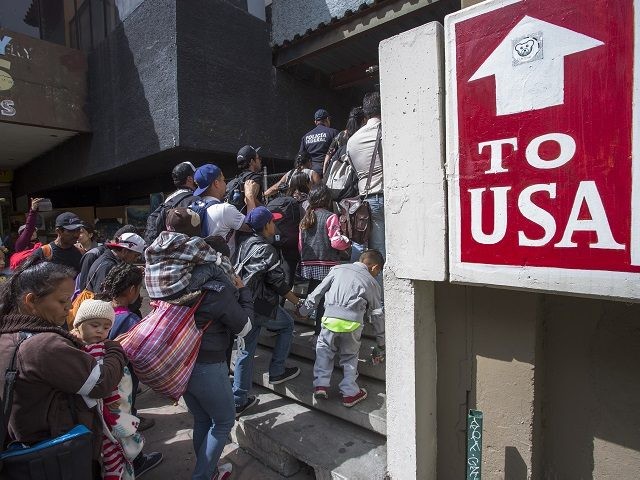The caravan of migrants from Central America seeking entry into the United States has illustrated many problems in our immigration system.
First, the migrants were aided and abetted by the Mexican government, which issued them transit or humanitarian visas as they traveled north to make it to the United States. Second, they were encouraged by open-borders activists, who agitated against U.S. immigration law and met the caravan when it arrived.
But the third and biggest problem is their exploitation of the asylum/refugee system. The caravan members are applying for asylum in large numbers. At least 158 have been allowed into the country for initial asylum interviews with U.S. immigration officers. Another 70 or so remain on the Mexican side of the border.
When an otherwise-illegal alien comes to the United States, he can claim political asylum when he gets here. Asylum applications from nationals of countries with rampant government persecution of particular ethnic groups or religions are expected. But the fact that these caravan members are claiming asylum is remarkable. They come predominantly from Honduras, El Salvador, and Guatemala.
To obtain asylum, an alien must demonstrate a “well-founded fear of persecution” in his country of origin, based on race, nationality, religion, membership in a particular social group, or political opinion. Furthermore, the persecution must be by agents of the government or must occur with the complicity of the government.
It appears that the vast majority of aliens in the caravan are claiming asylum simply based on the fact that they lived in poverty or in crime-ridden areas. They offered reasons such as “unemployment,” “gang threats,” or “fear of crime” for their asylum claims. But those are not valid bases for seeking asylum. If being poor or living in a crime-ridden country were enough to gain asylum, then the majority of people in the developing world would be entitled to it.
But that’s exactly what the open-borders activists assisting the caravan appear to want. One group, Clergy and Laity United for Economic Justice, or “CLUE,” declared that, “They are coming here because they are desperate due to conditions created by the United States….”
They even sent immigration attorneys to coach the aliens on how to best make an asylum application. Of course, a person who is truly seeking refuge from persecution by the government of his home country doesn’t need coaching. All he needs to do is truthfully tell his story to a U.S. immigration official.
Many aliens make up bogus stories of persecution in order to bolster their claims of asylum. Sometimes U.S. immigration officials are able to determine that such stories are fabricated, but often the aliens will succeed in fraudulently obtaining asylum.
A final problem is that the majority of asylum claimants are allowed to roam the United States for multiple years while their asylum claims are being adjudicated. They are also able to obtain employment authorization while their claims are pending.
Others disappear into the fabric of the country and fail to show up for their asylum hearings. But for them, simply getting across the border is mission accomplished. They figure that they can live illegally in the United States without much difficulty.
The Trump Administration has responded to the caravan appropriately – by sending additional Justice Department attorneys and immigration judges to the area to adjudicate the asylum claims quickly. This will reduce the risk that the asylum applicants disappear while their asylum claims languish for years.
Chances are, most of the applications will be rejected. Between 2011 and 2016, more than 75 percent of the asylum applications from Hondurans, Salvadorans, and Guatemalans were rejected.
But all it takes is one erroneous decision by an activist court (such as the Ninth Circuit of the U.S. Court of Appeals) to redefine the legal requirements for asylum to include some types of economic or crime-based distress. That seems to be what some in caravan are hoping for. That, or the possibility that they can disappear into the United States while their claims are being adjudicated. And if Congress passes an amnesty for illegal aliens someday, they will be waiting to get it.
Kris W. Kobach is the elected Secretary of State of Kansas. An expert in immigration law and policy, he coauthored the Arizona SB-1070 immigration law and represented in federal court the ten ICE agents who sued to stop Obama’s 2012 DACA executive amnesty. He is currently a candidate for governor in Kansas. His website is kriskobach.com.

COMMENTS
Please let us know if you're having issues with commenting.